- Cirque du Soleil’s “Crystal” at Fishers Event Center, a photo preview
- The Gatlin Brothers at Brown Country Music Center
- The Black Keys will perform at Innings Festival, Feb 21.
- Gary Clark Jr. will rock the Innings Festival 2025
- Fall Out Boy to appear at Innings Festival in February
- Kris Kristofferson passes away at 88
A Conversation with Leslie West
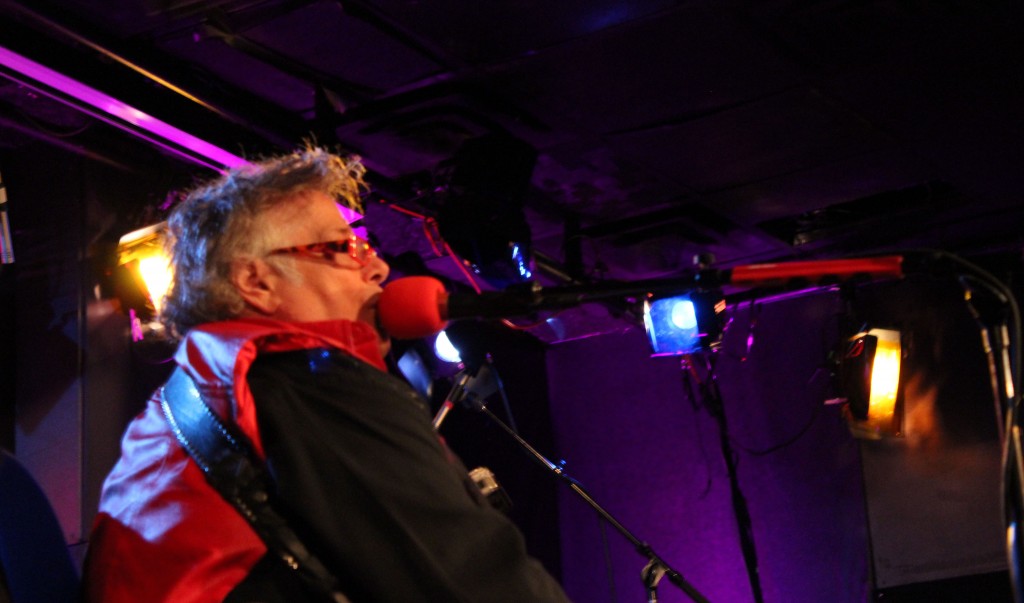 Leslie West has been part of rock & roll history for over forty years. While a member of the Vagrants, he would meet producer Felix Pappalardi and they soon would form the rock band Mountain. From the time they stepped onstage at Woodstock, Mountain created a hard-driving sound that was both creative, and all encompassing. The music of Mountain was loud and in your face, but could also be soft and beautiful. Blending the two was the gift they offered during their time together.
Leslie West has been part of rock & roll history for over forty years. While a member of the Vagrants, he would meet producer Felix Pappalardi and they soon would form the rock band Mountain. From the time they stepped onstage at Woodstock, Mountain created a hard-driving sound that was both creative, and all encompassing. The music of Mountain was loud and in your face, but could also be soft and beautiful. Blending the two was the gift they offered during their time together.
After Mountain, West formed West, Bruce and Laing, with Jack Bruce of Cream and Mountain drummer Corky Laing. West has also recorded as a solo artist over the years, but one thing remains constant: the guitar style of Leslie West can both kick you to the ground, and lift your soul to the heavens.
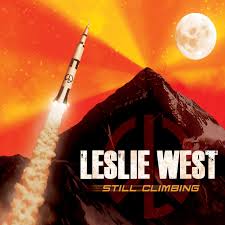 Recent years have seen heath issues take a toll on West. He has survived both cancer, and in 2011, the amputation of his lower right leg due to complications of a long struggle with diabetes. Last month he came back musically with a strong new album, Still Climbing, as well as an impressive return to the stage when he recently played a show at the Iridium in New York City.
Recent years have seen heath issues take a toll on West. He has survived both cancer, and in 2011, the amputation of his lower right leg due to complications of a long struggle with diabetes. Last month he came back musically with a strong new album, Still Climbing, as well as an impressive return to the stage when he recently played a show at the Iridium in New York City.
Right before his comeback show, I spoke with Leslie West.
Kath Galasso: Still Climbing is an impressive ride of original songs, covers and a revisiting of a musical treasure… that being “Long Red.” I’d like to talk about Red a little to start out. It’s been sampled by a virtual who’s who of Hip Hop royalty. What are your feelings about it?
Leslie West: I’m thrilled. When I wrote the song in ’69, believe me I wasn’t thinking about Hip Hop. I don’t think there was Hip Hop. Some of the artists that sampled it, like Jay-Z with “99 Problems,” Lana Del Ray’s done it, with different parts of the song, it’s quite something. And it’s not like they’re stealing it. They go through my publisher, which is the right thing to do. Yeah, I’m thrilled. I’ll see the platinum records on my wall and it makes me smile.
So tell me about the writing of “Long Red.”
I was listening to Traffic I think, and they had a song “You Can All Join In” and came up with this idea about some girl with really long red hair. And the words “tears and shades of gray, I have won, you have lost” it’s about I want to be with somebody and she won’t have anything to do with me at the time. But then all of a sudden I became famous and she finally came around, I didn’t want anything to do with her anymore.
The new album has several songs while not exactly lighthearted, are very powerful. The album begins with “Dying Since The Day I Was Born,” which while true, is a kind of glass half empty view of life. Driving and raw, tell me about it.
Well I think everybody’s dying since the day you were born. You buy a car and drive it out of the showroom, it depreciates 25% right off the bat. The title, my wife Jenni came up with the idea, and I had this idea for the bridge and the chorus. Then I got Mark Tremonti to play on it.
You sent the cut of it to Slash to get his opinion and said his reaction gave you confidence. Why did you send it to him?
I wanted him to tell me what I thought of the track. And he said ‘you can’t get much heavier than that.’ I guess I was thinking like “hey listen to this.” We’re good friends, he played on my last album. I gave him one of my Signature Leslie West guitars. He was one of the first few people I spoke to from Mississippi after I had my leg amputated. He’s a really great guy. Let’s put it this way, not that he’s talented, not that he’s famous, I mean the guy’s a rock star from the moment he opens his eyes in the morning. He just looks it and acts it. I think Rolling Stone had a poll of top guitarists and I was number 66. and he was 65. So I called and I said “Slash, listen I was 66 and you were 65 on the Rolling Stone Poll.” And he said “Well what poll?” I said the guitarists, the 100 greatest rock guitarists. And he said “are you kidding me, I’m lucky to be on any poll.” So his ego is very contained. That’s what I love about him.
 You cover a couple of well known songs on Still Climbing. The first is “Feeling Good,” written by Anthony Newley and Leslie Bricusse, from the Broadway show The Roar of the Greasepaint, the Smell of the Crowd. Now “Feeling Good” has been covered by everyone from Nina Simone to John Coltrane to the Pussycat Dolls. Your version just blows it up, and Dee Snider shares the vocals. What made you choose this song and how did Dee get involved?
You cover a couple of well known songs on Still Climbing. The first is “Feeling Good,” written by Anthony Newley and Leslie Bricusse, from the Broadway show The Roar of the Greasepaint, the Smell of the Crowd. Now “Feeling Good” has been covered by everyone from Nina Simone to John Coltrane to the Pussycat Dolls. Your version just blows it up, and Dee Snider shares the vocals. What made you choose this song and how did Dee get involved?
Again, I heard Stevie Winwood do it, and that’s what turned me on to it. There’s something about him and Traffic. First of all “Gimme Some Lovin” is my favorite song ever, and there’s not really any guitar in there at all. But the sound of the organ just blew me away. Once in a great while I try to play the organ part on guitar. It probably is one of the greatest guitar riffs or organs riffs whatever you want to call it, ever. But it’s (“Feeling Good”) a great song. I had Dee Snider who I know can sing, not just what he does with Twisted Sister. He came over to the studio and we sang it together, and I think some ways you couldn’t tell if it was Dee or it was me. I could tell and if you listen to it maybe twice you could tell, but when we were doing it, it was back and forth.
And why did you choose him to come in?
I love him. I know him a long, long time and I wanted him to do something he wouldn’t normally do, and it worked out great. So what I tried to do was while I have guys play on the album, I like to have them do this stuff that you wouldn’t normally have them do.
The other memorable cover on the album is a song heavily identified with Percy Sledge, “When A Man Loves A Woman.” On this track, Jonny Lang trades vocals and some mighty fine guitar licks. Were the two of you together for the recording?
He was on tour with Buddy Guy, a year ago last June, I started doing the album and I just put the track down. We picked him up at the airport, he had a day off before he was playing with Buddy on Saturday. We picked him up on Friday, my engineer Mike Goldberg picked him up and he also co-produced the album with me. So we went to the studio, sat about a foot away from each other and just played guitars. That was in the control room and then we went into the studio and sang it.
Besides Dee Snider and Jonny Lang, you have a few other guests sittin’ in. Johnny Winter appears on “Busted, Disgusted Or Dead.” How did you decide who to invite, and on which songs they would play?
I know what I’m talking about. Well, a year ago Johnny Winter and I were on tour with Edgar Winter and Rick Derringer. I talked to Johnny about starting the album and wanted him to play on a cut. And you know when someone says they’d love to do it, it might be “well I’m in Guam this week and I can’t really make it.”
I thought that would be a good one for both of us to play slide guitar on. He’s a really great slide player and that’s what he’s really known for. I have a totally different approach to slide than he does, so I thought it would sound good. And I was right; I was really thrilled with the way it came out.
My friend Jon Tiven wrote the words. He did a couple of things on Unusual Suspects as well. That was a very interesting lyric. I’m not really that into lyrics, I’m into the music first. My wife Jenni came up with some really good ones this time. I really didn’t want to work with my wife, writing back and forth because I had a bad experience with my former partner and bass player, Felix Pappalardi and his wife.
How did you find out about Felix being killed?
I was in Indiana with my band on the road opening for Queen. I heard Felix had died a lot of times, but this time I knew it was real. I was friendly with a news guy from Channel 7 (WABC-NY) Eyewitness News, John Johnson, and I called him. And he told me to call a certain precinct in New York. He didn’t say yes or no. He just said “Leslie, I think you better call the precinct.” So I called and right away the guy answered the phone, I told him why I was calling and he said “let put me through upstairs to the Sargeant.” As soon as he said that, I knew. It was too bad.
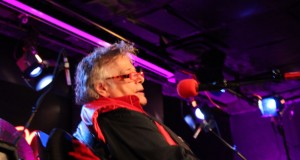 One thing I’ve always enjoyed about your guitar playing is how it fits the song, and I read a quote where you talked about how some guitar solos have nothing to do with the song. Just some guy playing really fast. Yes. I won’t name names, but it’s so much more entertaining when the guitarist isn’t off on an ego trip of shredding, but that the solo has some relationship to the song.
One thing I’ve always enjoyed about your guitar playing is how it fits the song, and I read a quote where you talked about how some guitar solos have nothing to do with the song. Just some guy playing really fast. Yes. I won’t name names, but it’s so much more entertaining when the guitarist isn’t off on an ego trip of shredding, but that the solo has some relationship to the song.
Well I can’t, what do you call it shredding? I can’t do that. I only play with two fingers really. I guess a guitar solo to me is like an interlude in the song, it’s supposed to take you on a little journey and then bring you back to the song. So I’m trying to think about the most that comes out of the chords that I’m actually playing. It’s an important thing, a guitar solo, and if you’re gonna do one, do a good one. Especially if you’re in a three-piece group, there’s a lot of soloing going on.
On one of the tracks “Not Over You At All,” I have a sax solo. I have Arno Hecht of the Uptown Horns do the first solo. If you take Keith Richards guitar on “Satisfaction,” the first solo is supposed to sound like a saxophone, and it did sound like a saxophone. So that’s what I’m thinking sometimes when I play. I’m thinking that I’m playing a horn. But he did a really nice job on it, Arno.
Now do you have an internal gauge that clicks when you do a solo, of your limits of where you go with it?
No, most of the solos I do are not all in one take. The only solo I think I’ve done, maybe two, one I know in my career that I did in one take was “Theme For An Imaginary Western.” I got really lucky, it just kept coming out and it was one take. You don’t really get that lucky. Most of the ones on this album and Unusual Suspects, you do a couple of solos and put them together and make a song. But sometimes I’m thinking about a horn, or a violin, something other than the guitar. And sometimes that’s all I’m thinking about is the guitar.
I just want to ask you, forty something years after Woodstock, Mountain was not in the film and the songs on the soundtrack were not from Woodstock.
We were on Woodstock II. I don’t know what happened (with Woodstock the movie). Whether my management at the time couldn’t make a deal or they lost the film. I don’t know why we weren’t in the movie, but it’s too bad. But the reason we were on the show in the first place was Jimi Hendrix agent Ron Terry, was our agent. He booked Hendrix on the show and he must have made them take us. That’s what I think.
And I got married on stage when they had the 40th anniversary reunion 4 ½ years ago. Jenni and I were planning and I said, let me see. They had a beautiful patio in the back of the stage on both sides, and so I said I’d love to get married. Jenni and I went up there and got the marriage license. And I announced it to the crowd, people were in shock, they didn’t believe it. Then all of a sudden, the Justice of the Peace walked out, a minute later, my group was holding the guitars in an archway and Jenni walked out. Yeah, it was for real.
And boy, those vows of sickness and health really came into play in a couple of years.
Oh yeah, let me tell you, Jenni West saved my life in more ways than one.
Interview by Kath Galasso Kat’s Theory of Music

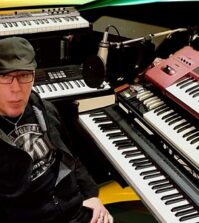

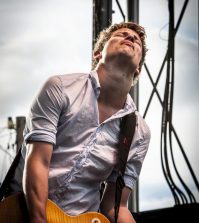
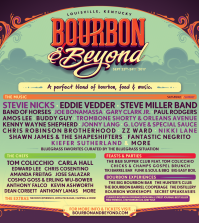



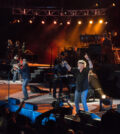
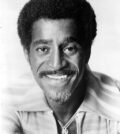
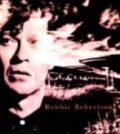
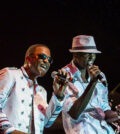




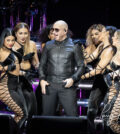
0 comments